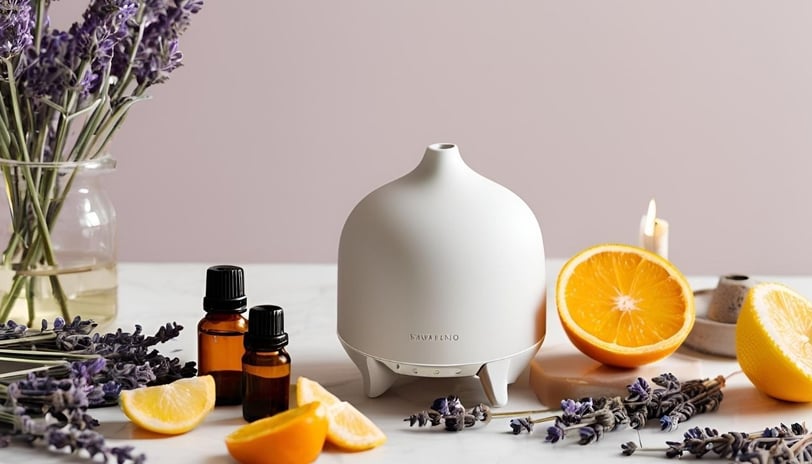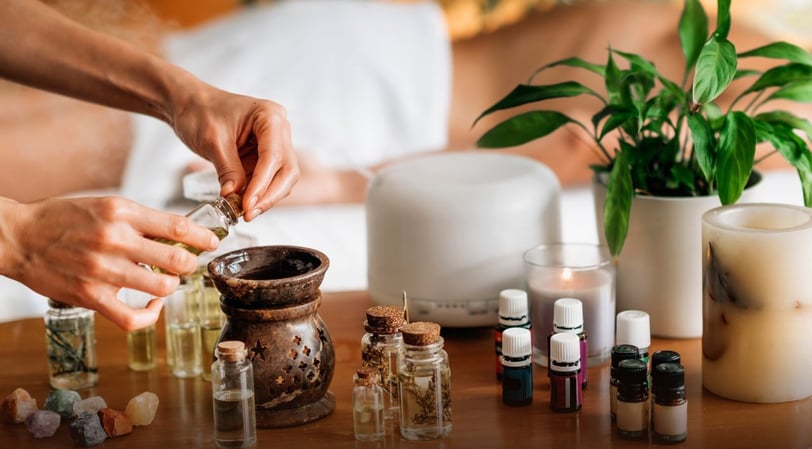The Healing Power of Essential Oils: Aromatherapy for Stress, Sleep, and Focus
Have you ever inhaled the calming scent of lavender or felt invigorated by the fresh aroma of peppermint? These experiences highlight the therapeutic potential of essential oils, concentrated plant extracts that have been used for centuries to enhance emotional and physical well-being. Aromatherapy, the practice of using essential oils for healing, offers natural solutions for modern challenges like stress, sleeplessness, and difficulty concentrating. This guide will explore the science behind essential oils, their benefits, and safe ways to incorporate them into your daily life.


What Are Essential Oils?
Essential oils are aromatic compounds extracted from plants through methods like steam distillation or cold pressing. They capture the plant’s scent and therapeutic properties in a concentrated form.
Each essential oil contains unique chemical compounds that interact with your body to promote relaxation, energy, or focus. For example:
Lavender: Rich in linalool, which has calming effects.
Peppermint: Contains menthol, known for its invigorating properties.
Citrus oils (like lemon or orange): High in limonene, a mood-lifting compound.
How Aromatherapy Works
Aromatherapy works primarily through two pathways:
Inhalation: When you inhale essential oils, the molecules travel through your olfactory system and directly influence the brain's limbic system, which governs emotions, memory, and stress responses.
Topical Application: When diluted with a carrier oil (like coconut or jojoba oil), essential oils can be applied to the skin. They absorb into the bloodstream and provide localized or systemic benefits.
Benefits of Essential Oils
1. Stress Relief
Stress is one of the most common reasons people turn to aromatherapy. Essential oils can help:
Lavender: Reduces cortisol levels and promotes relaxation.
Bergamot: A citrus oil that helps alleviate anxiety.
Chamomile: Soothes nerves and encourages emotional balance.
2. Better Sleep
For those struggling with insomnia or restless nights, essential oils can create a calming bedtime ritual.
Lavender: Helps you fall asleep faster and improves sleep quality.
Cedarwood: Has a grounding effect, ideal for calming an overactive mind.
Vetiver: A deeply relaxing oil often used to manage anxiety and improve sleep.
3. Improved Focus and Energy
Essential oils can sharpen concentration and boost productivity:
Peppermint: Enhances cognitive performance and clears mental fog.
Rosemary: Improves memory retention and focus.
Lemon: Uplifts mood and energizes the mind.
How to Use Essential Oils Safely
1. Inhalation Methods
Diffusers: Add 5–10 drops of essential oil to a diffuser for continuous aromatherapy.
Steam Inhalation: Add a few drops to a bowl of hot water, place a towel over your head, and inhale deeply.
On-the-Go: Place a drop on a tissue or cotton ball and sniff as needed.
2. Topical Application
Always dilute essential oils before applying them to the skin to avoid irritation. Use a 2–3% dilution:
Add 12–15 drops of essential oil to 1 ounce (30 ml) of carrier oil.
Apply to pulse points like wrists, temples, or the back of your neck.
3. Aromatic Sprays
Create a room spray by mixing:
1 cup of distilled water
1–2 teaspoons of witch hazel
15–20 drops of your chosen essential oil.
4. Bath Soaks
Add 5–10 drops of essential oil to a warm bath, mixing it first with a carrier oil or Epsom salts to prevent skin irritation.
Precautions for Safe Use
Avoid Internal Use: Essential oils should not be ingested unless under the guidance of a qualified professional.
Patch Test: Test for skin sensitivity by applying a diluted drop to a small area before widespread use.
Pregnancy and Medical Conditions: Consult a healthcare provider if you are pregnant, nursing, or have underlying health conditions.
Child Safety: Use milder oils like chamomile or lavender for children and keep essential oils out of reach.
DIY Essential Oil Blends
For Stress Relief:
3 drops lavender
2 drops bergamot
2 drops ylang-ylang
For Sleep:
4 drops cedarwood
3 drops lavender
2 drops chamomile
For Focus:
3 drops rosemary
2 drops peppermint
2 drops lemon
Add these blends to a diffuser or dilute them for topical use.
The Science Behind Aromatherapy
Research supports the efficacy of essential oils:
Stress Relief: A 2017 study found that inhaling lavender oil significantly reduced anxiety levels.
Sleep Aid: Research published in Nursing in Critical Care demonstrated lavender’s ability to improve sleep quality in patients.
Enhanced Focus: A study in Therapeutic Advances in Psychopharmacology highlighted rosemary oil’s memory-boosting effects.
Common Myths About Essential Oils
Myth: Essential oils are completely safe because they’re natural.
Fact: They are potent and should be used responsibly. Always dilute and follow recommended guidelines.Myth: The more oil you use, the better the results.
Fact: A little goes a long way. Overuse can lead to adverse reactions.Myth: All oils are created equal.
Fact: Look for pure, therapeutic-grade oils from reputable sources. Synthetic fragrances lack the benefits of natural essential oils.
Conclusion
Essential oils offer a powerful, natural way to manage stress, improve sleep, and enhance focus. By incorporating them into your daily routine, you can create moments of calm, clarity, and joy.
Whether you diffuse lavender before bed, apply a focus-enhancing blend during work, or unwind with a calming bath soak, the possibilities are endless. Explore the world of aromatherapy and experience the healing power of essential oils for yourself.


Products Reviews
Disclaimer
The statements on this website have not been evaluated by the Food and Drug Administration. The articles and products advertised are not intended to diagnose, treat, cure, or prevent any disease.
The content of the website and the products advertised are based on the opinions of the authors and are provided solely on an "AS IS" and "AS AVAILABLE" basis. You should do your own research and confirm information with other sources when seeking information about health issues, and always carefully review the information with your healthcare professional before using any of the protocols presented on this website and/or the products indicated. Neither Drops&Pills nor the authors are engaged in rendering medical or similar professional services or advice through this website or the products, and the information provided is not intended to replace medical advice offered by a physician or other licensed healthcare professional. You should not construe the recommendation of the products by Drops&Pills as an endorsement by Drops&Pills of the opinions expressed herein, or any guarantee of any strategy, recommendation, treatment, action, or application of advice made by the authors of the products.
Some names and personally identifiable information on this site have been changed to protect the privacy of individuals.
Drops&Pills is the publisher of the articles on this site. Drops&Pills' role as publisher does not constitute an endorsement, approval or review of the products advertised herein or any claim, statement or opinion used in the promotion of those products.
For product support, please contact the suppliers.
For purchase and order support, please contact the platform you placed the order through.
For support with article information, please contact Drops&Pills here.
*Free shipping according to the rules on the product page.
Natural Products for Better Health
© Drops&Pills Research 2025 All rights reserved
Contacts
contact@dropsandpills.com
